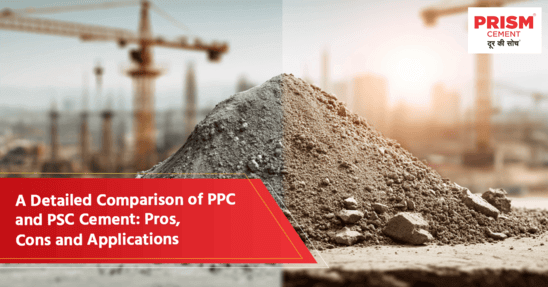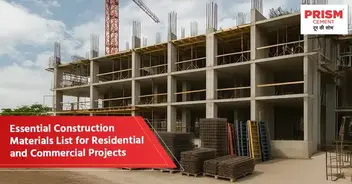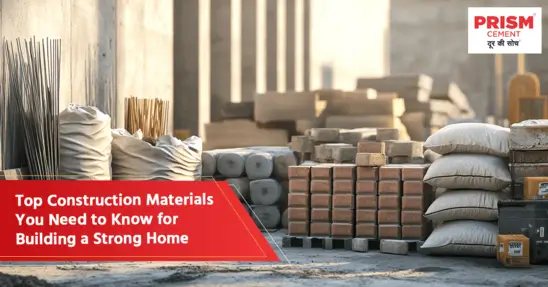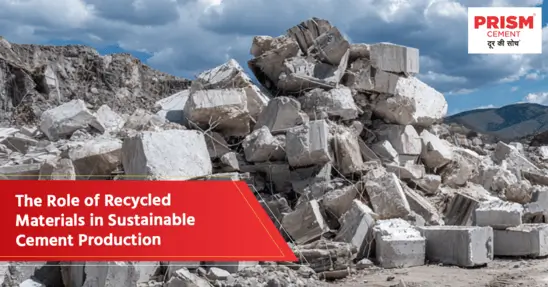Selecting an appropriate type of cement is essential for ensuring the durability and strength of a construction project. Two types of cement that are commonly used are Portland Pozzolana Cement (PPC) and Portland Slag Cement (PSC). Each possesses distinct properties, advantages and limitations that make them suitable for various applications. This blog will provide a comprehensive comparison between PPC and PSC cement, enabling you to make an informed decision.
PPC Cement: Properties and Applications
PPC cement, or Portland Pozzolana Cement, is extensively used in contemporary buildings. It comprises clinker, gypsum and pozzolanic materials like fly ash. These enhance the workability and durability of the cement. PPC cement is traditionally used in buildings, bridges and industrial complexes because of its high resistance to chemical attacks and environmental conditions. Its slow process of hydration helps to minimize crack risks, hence making it an ideal choice for large projects.
Pros of PPC Cement
- Increased strength and durability in the long term
- Enhanced resistance to sulfate attack
- Lower heat of hydration, reducing thermal cracks
- Eco-friendly, as industrial by-products are used
Cons of PPC Cement
- Longer setting time than other types of cement
- Unsuitable for applications requiring early strength
- Slightly more expensive in certain areas
Applications of PPC Cement
- Residential and commercial buildings
- Hydraulic structures such as dams, bridges and marine structures
- Plastering and masonry work
- Roads and pavements
PSC Cement: Properties and Applications
PSC cement or Portland Slag Cement is yet another construction cement. It is manufactured by combining clinker, gypsum and granulated blast furnace slag. Slag added to it gives it greater strength, and thus it is applicable in marine works, bridges, and industrial constructions in harsh weather conditions. The heat of hydration of PSC cement is low, which keeps the risk of thermal cracking low in large-scale concrete structures.
Pros of PSC Cement
- Greater longevity in harsh environments
- Enhanced resistance to sulfate and chloride attacks
- Low permeability, hindering water percolation
- Environment-friendly owing to slag composition
Cons of PSC Cement
- Slightly lower early strength compared to OPC
- Takes more time to attain full strength
- Limited availability in some areas
Applications of PSC Cement:
- Marine structures (docks, harbors, and jetties)
- Underground and water-retaining structures (sewage treatment plants, reservoirs, and tunnels)
- High-rise buildings and mass concrete works
- Bridges and highways.
Comparison Table: PPC vs PSC Cement
| Property | PPC Cement | PSC Cement |
|---|---|---|
| Raw Materials | OPC + Fly ash/pozzolanic materials | OPC + Granulated blast furnace slag |
| Strength Gain | Slower but gains high long-term strength | Slower but durable in the long run |
| Durability | Resistant to chemical attacks, moderate water resistance | High durability, superior water resistance |
| Workability | Good workability due to fine particles | Excellent workability and smooth finish |
| Heat of Hydration | Low – reduces thermal cracks | Very low – best for mass concreting |
| Eco-friendliness | High – uses fly ash (industrial waste) | High – uses slag (industrial by-product) |
| Cost | Generally economical | Slightly costlier than PPC |
| Best Suited For | General construction, plastering, roads | Marine structures, bridges, water-retaining structures |
Conclusion: The Choice Between PPC and PSC Cement
The choice of construction cement is based on the nature of the project. PPC cement is best suited for general buildings, including housing and bridges. It is cost-effective and has a long life, which makes it widely used in large projects. PSC cement is an excellent choice for projects where durability and resistance to aggressive environmental factors are critical. Whether it is construction in coastal areas, industrial zones with high chemical exposure, PSC cement provides superior protection against corrosion and chemical attack.
FAQs
Q1. How are the compositions of PPC and PSC cement different?
Answer: PPC cement includes pozzolanic materials such as fly ash, while PSC cement includes granulated blast furnace slag. While both add strength, they serve different purposes in accordance with composition.
Q2. For residential construction, which is more suitable, PPC or PSC cement?
Answer: PPC cement is mainly used for residential buildings because it is workable, cost-effective and durable. It can be used for walls, foundations and general concrete purposes.
Q3. What are the merits and demerits of PPC cement?
Answer: PPC cement provides durability, chemical resistance and environmental friendliness. PPC cement has a slow setting time and might not be suitable for applications where fast development of strength is necessary.
Q4. Is PSC cement stronger than PPC for industrial and marine structures?
Answer: Yes, PSC cement is stronger than PPC for industrial and marine structures. Its high slag content enhances resistance to sulfate and chloride attack, which makes it suitable for hostile environments.
Q5. How does PPC and PSC cement affect the cost and sustainability of construction projects?
Answer: PPC cement is affordable and eco-friendly because it uses fly ash, whereas PSC cement is durable and sustainable in the long term by using industrial waste products such as slag. Both of them help to minimize carbon footprints in building construction.




